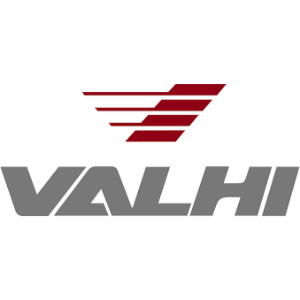VALHI REPORTS THIRD QUARTER 2021 RESULTS
Rhea-AI Summary
Valhi reported a net income of $39.0 million in Q3 2021, up from $15.4 million in Q3 2020, equating to $1.36 per share. For the first nine months, net income reached $75.2 million, or $2.64 per diluted share, compared to $30.7 million, or $1.08 per diluted share in 2020. Key factors for growth included higher operating results across segments, particularly in Chemicals and Component Products, with net sales in the Chemicals Segment rising to $499.8 million in Q3 2021 from $416.9 million in Q3 2020, driven by stronger demand and increased TiO2 prices.
Positive
- Net income grew to $39.0 million in Q3 2021, a significant increase from $15.4 million in Q3 2020.
- Net sales in the Chemicals Segment reached $499.8 million in Q3 2021, reflecting higher sales volumes and prices.
- Operating income from Chemicals Segment increased to $60.3 million in Q3 2021, up from $21.6 million in Q3 2020.
- Component Products Segment net sales rose to $34.5 million in Q3 2021, compared to $28.4 million in Q3 2020.
- Real Estate Management and Development Segment saw sales increase to $44.6 million in Q3 2021, up from $13.3 million in Q3 2020.
Negative
- Operating income was partially offset by increased costs for raw materials and energy.
- Fluctuations in currency exchange rates negatively impacted operating income by approximately $15 million in the year-to-date period.
News Market Reaction 1 Alert
On the day this news was published, VHI gained 6.14%, reflecting a notable positive market reaction.
Data tracked by StockTitan Argus on the day of publication.
Dallas, Texas, Nov. 04, 2021 (GLOBE NEWSWIRE) -- Valhi, Inc. (NYSE: VHI) reported net income attributable to Valhi stockholders of
The Chemicals Segment’s net sales were
The Chemicals Segment’s operating income in the third quarter of 2021 was
The Component Products Segment’s net sales were
The Real Estate Management and Development Segment had sales of
Corporate expenses in the third quarter and first nine months of 2021 were comparable to the same periods of 2020. In the first nine months of 2021 we sold excess property not used in our operations for net proceeds of approximately
The statements in this press release relating to matters that are not historical facts are forward-looking statements that represent management's beliefs and assumptions based on currently available information. Although we believe the expectations reflected in such forward-looking statements are reasonable, we cannot give any assurances that these expectations will be correct. Such statements by their nature involve substantial risks and uncertainties that could significantly impact expected results, and actual future results could differ materially from those predicted. While it is not possible to identify all factors, we continue to face many risks and uncertainties. Among the factors that could cause our actual future results to differ materially include, but are not limited to, the following:
- Future supply and demand for our products;
- The extent of the dependence of certain of our businesses on certain market sectors;
- The cyclicality of certain of our businesses (such as Kronos’ TiO2 operations);
- Customer and producer inventory levels;
- Unexpected or earlier-than-expected industry capacity expansion (such as the TiO2 industry);
- Changes in raw material and other operating costs (such as ore, zinc, brass, aluminum, steel and energy costs);
- Changes in the availability of raw materials (such as ore);
- General global economic and political conditions that harm the worldwide economy, disrupt our supply chain, increase material costs, reduce demand or perceived demand for TiO2, component products and land held for development or impair our ability to operate our facilities (including changes in the level of gross domestic product in various regions of the world, natural disasters, terrorist acts, global conflicts and public health crises such as COVID-19);
- Competitive products and substitute products;
- Customer and competitor strategies;
- Potential difficulties in integrating future acquisitions;
- Potential difficulties in upgrading or implementing accounting and manufacturing software systems;
- Potential consolidation of our competitors;
- Potential consolidation of our customers;
- The impact of pricing and production decisions;
- Competitive technology positions;
- Our ability to protect or defend intellectual property rights;
- The introduction of trade barriers or trade disputes;
- The ability of our subsidiaries to pay us dividends;
- The impact of current or future government regulations (including employee healthcare benefit related regulations);
- Uncertainties associated with new product development and the development of new product features;
- Fluctuations in currency exchange rates (such as changes in the exchange rate between the U.S. dollar and each of the euro, the Norwegian krone and the Canadian dollar and between the euro and the Norwegian krone) or possible disruptions to our business resulting from uncertainties associated with the euro or other currencies;
- Operating interruptions (including, but not limited to, labor disputes, leaks, natural disasters, fires, explosions, unscheduled or unplanned downtime, transportation interruptions, cyber-attacks and public health crises such as COVID-19);
- Decisions to sell operating assets other than in the ordinary course of business;
- The timing and amounts of insurance recoveries;
- Our ability to renew, amend, refinance or establish credit facilities;
- Our ability to maintain sufficient liquidity;
- The ultimate outcome of income tax audits, tax settlement initiatives or other tax matters, including future tax reform;
- Our ability to utilize income tax attributes, the benefits of which may or may not have been recognized under the more-likely-than-not recognition criteria;
- Environmental matters (such as those requiring compliance with emission and discharge standards for existing and new facilities, or new developments regarding environmental remediation at sites related to our former operations);
- Government laws and regulations and possible changes therein (such as changes in government regulations which might impose various obligations on former manufacturers of lead pigment and lead-based paint, including NL, with respect to asserted health concerns associated with the use of such products) including new environmental health and safety regulations such as those seeking to limit or classify TiO2 or its use;
- The ultimate resolution of pending litigation (such as NL’s lead pigment and environmental matters);
- Our ability to comply with covenants contained in our revolving bank credit facilities;
- Our ability to complete and comply with the conditions of our licenses and permits;
- Changes in real estate values and construction costs in Henderson, Nevada;
- Water levels in Lake Mead; and
- Possible future litigation.
Should one or more of these risks materialize (or the consequences of such development worsen), or should the underlying assumptions prove incorrect, actual results could differ materially from those currently forecasted or expected. We disclaim any intention or obligation to update or revise any forward-looking statement whether as a result of changes in information, future events or otherwise.
Valhi, Inc. is engaged in the chemicals (TiO2), component products (security products and recreational marine components) and real estate management and development industries.
* * * * *
| VALHI, INC. AND SUBSIDIARIES | |||||||||||||||
| CONDENSED SUMMARY OF OPERATIONS | |||||||||||||||
| (In millions, except earnings per share) | |||||||||||||||
| Three months ended | Nine months ended | ||||||||||||||
| September 30, | September 30, | ||||||||||||||
| 2020 | 2021 | 2020 | 2021 | ||||||||||||
| (unaudited) | |||||||||||||||
| Net sales | |||||||||||||||
| Chemicals | $ | 416.9 | $ | 499.8 | $ | 1,223.9 | $ | 1,443.4 | |||||||
| Component products | 28.4 | 34.5 | 84.5 | 106.7 | |||||||||||
| Real estate management and development | 13.3 | 44.6 | 24.5 | 63.1 | |||||||||||
| Total net sales | $ | 458.6 | $ | 578.9 | $ | 1,332.9 | $ | 1,613.2 | |||||||
| Operating income | |||||||||||||||
| Chemicals | $ | 21.6 | $ | 60.3 | $ | 104.3 | $ | 145.4 | |||||||
| Component products | 2.1 | 5.1 | 9.5 | 16.7 | |||||||||||
| Real estate management and development | 5.2 | 15.8 | 25.4 | 26.0 | |||||||||||
| Total operating income | 28.9 | 81.2 | 139.2 | 188.1 | |||||||||||
| General corporate items: | |||||||||||||||
| Securities earnings | .9 | .9 | 3.5 | 2.9 | |||||||||||
| Insurance recoveries | - | - | 1.6 | - | |||||||||||
| Gain on land and related sales | - | 10.4 | .5 | 16.0 | |||||||||||
| Changes in market value of Valhi common stock held by subsidiaries | .7 | (.2 | ) | (2.2 | ) | 2.0 | |||||||||
| Other components of net periodic pension and OPEB expense | (5.2 | ) | (4.3 | ) | (14.9 | ) | (13.2 | ) | |||||||
| General expenses, net | (8.4 | ) | (8.7 | ) | (26.0 | ) | (26.1 | ) | |||||||
| Interest expense | (8.9 | ) | (7.9 | ) | (27.4 | ) | (25.2 | ) | |||||||
| Income before income taxes | 8.0 | 71.4 | 74.3 | 144.5 | |||||||||||
| Income tax expense (benefit) | (11.4 | ) | 16.9 | 21.2 | 35.2 | ||||||||||
| Net income | 19.4 | 54.5 | 53.1 | 109.3 | |||||||||||
| Noncontrolling interest in net income | |||||||||||||||
| of subsidiaries | 4.0 | 15.5 | 22.4 | 34.1 | |||||||||||
| Net income attributable to Valhi stockholders | $ | 15.4 | $ | 39.0 | $ | 30.7 | $ | 75.2 | |||||||
| Amounts attributable to Valhi stockholders: | |||||||||||||||
| Basic and diluted net income per share | $ | .54 | $ | 1.36 | $ | 1.08 | $ | 2.64 | |||||||
| Basic and diluted weighted average shares outstanding | 28.5 | 28.5 | 28.5 | 28.5 | |||||||||||
| VALHI, INC. AND SUBSIDIARIES | |||||||||||
| IMPACT OF PERCENTAGE CHANGE IN CHEMICAL SEGMENT'S NET SALES | |||||||||||
| (unaudited) | |||||||||||
| Three months ended | Nine months ended | ||||||||||
| September 30, | September 30, | ||||||||||
| 2021 vs. 2020 | 2021 vs. 2020 | ||||||||||
| Percentage change in TiO2 net sales : | |||||||||||
| TiO2 sales volumes | 6 | % | 8 | % | |||||||
| TiO2 product pricing | 11 | 4 | |||||||||
| TiO2 product mix/other | 2 | 2 | |||||||||
| Changes in currency exchange rates | 1 | 4 | |||||||||
| Total | 20 | % | 18 | % | |||||||








